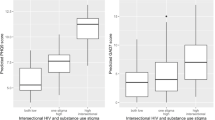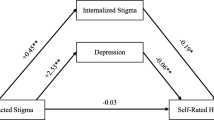Abstract
Evidence suggests that HIV-related stigma is a contributing factor to mental health and substance use problems among people living with HIV (PLWH). Limited research, however, has examined the differential effects that multiple stigma constructs, specifically, anticipated, enacted, and internalized stigma may have on mental health and alcohol use disorders among PLWH. Furthermore, no studies have examined this relationship within the larger context of urban life stressors. The purpose of this study was to examine associations of an overall HIV-related stigma measure and four HIV stigma subscales on depression, anxiety, and hazardous drinking among a sample of 380 PLWH in New Orleans. Log-Poisson models with generalized estimating equations were used to estimate relative risks (RR) and 95% confidence intervals (CI). A test of interaction was used to determine presence of effect modification by urban life stressors. Overall, higher levels of HIV-stigma were associated with depressive symptoms (RR 1.67, 95% CI 1.25, 2.23), anxiety symptoms (RR 1.91, 95% CI 1.17, 3.12), and hazardous drinking (RR 1.45, 95% CI 1.02, 2.05). Internalized HIV-stigma (measured using the negative self-image subscale) was associated with all three outcomes and had the highest magnitude point estimates across the four stigma subscales. Urban life stressors, measured by the Urban Life Stressors Scale (ULSS), modified the association between HIV-related stigma and mental health and alcohol use disorders (P < 0.2), highlighting the importance for examining the larger urban environmental context. Findings from this study may inform interventions to reduce HIV-related stigma operating at the individual and structural level.
Similar content being viewed by others
References
Logie C, Gadalla TM. Meta-analysis of health and demographic correlates of stigma towards people living with HIV. AIDS Care. 2009;21(6):742–53.
Ciesla JA, Roberts JE. Meta-analysis of the relationship between HIV infection and risk for depressive disorders. Am J Psychiatry. 2001;158(5):725–30.
Bogart LM, Wagner GJ, Galvan FH, Landrine H, Klein DJ, Sticklor LA. Perceived discrimination and mental health symptoms among black men with HIV. Cult Divers Ethn Minor Psychol. 2011;17(3):295–302.
Bing EF, Burnam MA, Longshore D, et al. Psychiatric disorders and drug use among human immunodeficiency virus-infected adults in the United States. Arch Gen Psychiatry. 2001;58(8):721–8.
Gore-Felton C, Koopman C. Traumatic experiences: harbinger of risk behavior among HIV-positive adults. J Trauma Dissociation. 2002;3(4):125–35.
Kessler RC, Chiu WT, Demler O, Walters EE. Prevalence, severity, and comorbidity of twelve-month DSM-IV disorders in the National Comorbidity Survey Replication (NCS-R). Arch Gen Psychiatry. 2005;62(6):617–27.
Durvasula R, Miller T. Substance abuse treatment in persons with HIV/AIDS: challenges in managing triple diagnosis. Behav Med. 2014;40(2):43–52.
UNAIDS. On the fast-track to end AIDS by 2030: focus on location and population. Geneva: UNAIDS; 2015.
Rueda S, Mitra S, Chen S, Gogolishvili D, Globerman J, et al. Examining the associations between HIV-related stigma and health outcomes in people living with HIV/AIDS: a series of meta-analyses. BMJ Open. 2016;6(7):e011453.
Rintamaki LS, Davis TC, Skripkauskas S, Bennett CL, Wolf MS. Social stigma concerns and HIV medication adherence. AIDS Patient Care STDs. 2005;20:359–68.
Vanable P, Carey M, Blair D, Littlewood R. Impact of HIV-related stigma on health behaviors and psychological adjustment among HIV-positive men and women. AIDS Behav. 2006;10(5):473–82.
Tucker JS, Burnam MA, Sherbourne CD, Kung FY, Gifford AL. Substance use and mental health correlates of nonadherence to antiretroviral medications in a sample of patients with human immunodeficiency virus infection. Am J Med. 2003;114(7):573–80.
Chander G, Lau B, Moore RD. Hazardous alcohol use: a risk factor for non-adherence and lack of suppression in HIV infection. J Acquir Immune Defic Syndr. 2006;43(4):411–7.
Wardell J, Shuper P, Rourke S, Hendershot C. Stigma, coping, and alcohol use severity among people living with HIV: a prospective analysis of bidirectional and mediated associations. Ann Behav Med. 2018;52:762–72.
Blashill AJ, Perry N, Safren SA. Mental health: a focus on stress, coping, and mental illness as it relates to treatment retention, adherence and other health outcomes. Curr HIV/AIDS Rep. 2011;8(4):215–22.
Earnshaw V, Chaudoir S. From conceptualizing to measuring HIV stigma: a review of HIV stigma mechanism measures. AIDS Behav. 2009;13(6):1160–77.
Earnshaw V, Smith L, Chaudoir S, Amico KR, Copenhaver M. HIV stigma mechanisms and well-being among PLWH: a test of the HIV stigma framework. AIDS Behav. 2013;17(5):1785–95.
Turan B, Budhwani H, Pariya FL, et al. How does stigma affect people living with HIV? The mediating roles of internalizzed and anticipated HIV stigma in the effects of perceived community stigma on health and psychosocial. AIDS Behav. 2017;21:283–91.
Charles B, Jayaseelan L, Pandian AK, Sam AE, Thenmozhi M, et al. Association between stigma, depression and quality of life of people living with HIV/AIDS (PLHA) in South India - a community based cross sectional study. BMC Public Health. 2012;12:463.
Simbayi L, Strebel A, Cloete A, Henda N, Mqeketo A. Internalized stigma, discrimination, and depression among men and women living with HIV/AIDS in Cape Town, South Africa. Soc Sci Med. 2007;64(9):1823–31.
Hatzenbuehler M, Phelan J, Link B. Stigma as a fundamental cause of population health inequalities. Am J Public Health. 2013;103(5):813–21.
Meyer IH. Minority stress and mental health in gay men. J Health Soc Behav. 1995;36(1):38–56.
Hatzenbuehler M. How does sexual minority stigma “get under the skin”? A Psychological Mediation Framework. Psychol Bull. 2009;135(5):707–30.
Pellowski JA, Kalichman SC, Matthews KA, Adler N. A pandemic of the poor: social disadvantage and the US HIV epidemic. Am Psychol. 2013;68(4):197–209.
Gant Z, Lomotey M, Hall H, Hu X, Guo X, et al. A county-level examination of the relationship between HIV and social determinants of health: 40 states, 2006–2008. Open AIDS J. 2012;6(1):1–7.
Ironson G, Stuetzle R, Fletcher M. An increase in religiousness/spirituality occurs after HIV diagnosis and predicts slower disease progression over 4 years in people with HIV. J Gen Intern Med. 2006;21(supplement 5):S62–8.
Lesesrman J. HIV disease progression: depression, stress, and possible mechanisms. Biol Psychiatry. 2003;54(3):295–306.
Lesesrman J, Petitto JM, Golden RN, et al. Impact of stressful life events, depression, social support, coping, and cortisol on progression to AIDS. Am J Psychiatriy. 2000;157(8):1221–8.
Latikn CA, Curry AD. Stressful neighborhoods and depression: a prospective study of the impact of neighborhood disorder. J Health Soc Behav. 2003;44(1):34–44.
Latkin C, Curry A, Hua W, Davey M. Direct and indirect associations of neighborhood disorder with drug-use and high-risk sexual partners. Am J Prev Med. 2007;32(6 Suppl):S234–41.
Welsh D, Ferguson T, Theall K, et al. The New Orleans alcohol use in HIV [NOAH] study: a translational investigation of alcohol use, biological and socioenvironmental mechanisms, and geriatric multi-morbidity in people living with HIV. Alcohol Clin Exp Res. 2019;43(4):704–9.
United States Census Bureau. QuickFacts: New Orleans City, Louisiana. 2018; https://www.census.gov/quickfacts/neworleanscitylouisiana#qf-headnote-a. Accessed 1 July 2018.
Lowe K. Environmental justice and pedestrianism: sidewalk continuity, race, and poverty in New Orleans, Louisiama. Transp Res Rec. 2016;2598(1):119–23.
Wellford C, Bond BJ, Goodison S. Crime in New Orleans: analyzing crime trends and New Orleans’ responses to crime. In: Justice USDo, editor. . Baltimore: University of Maryland; 2011.
Kegler S, Dahlberg L, Mercy J. Firearm homicides and suicides in major metropolitan areas, 2012–2013 and 2015–2016. MMWR Morb Mortal Wkly Rep. 2018; 67(44):1233–1237.
Berger B, Ferrans C, Lashley R. Measuring stigma in people with HIV: psychometric assessment of the HIV stigma scale. Res Nurs Health. 2001;24:518–29.
Saunders JB, Aasland OG, Babor TF, de la Fuente JR, Grant M. Development of the alcohol use disorders identification test (AUDIT): WHO collaborative project on early detection of person with harmful consumption—II. Addiction. 1993;88(6):791–804.
Bohn MJ, Babor TF, Kranzler HR. The alcohol-use disorders identification test (Audit) - validation of a screening instrument for use in medical settings. J Stud Alcohol. 1995;56(4):423–32.
Valladolid GR, Vicedo JB, Sanchez-Serrano MCC, Carrasco JSD. Validation of the alcohol use disorders identification test (AUDIT) in primary care. Rev Clin Esp. 1998;198(1):11–4.
Tang YL, Jovanovic T, Wingo A, Michopoulos V, Schwartz A, Ressler KJ. Validation of the alcohol use disorders identification test (AUDIT) in an inner city primary care Sample. Biol Psychiatry. 2015;77(9):374s–374s.
Lundin A, Hallgren M, Balliu N, Forsell Y. The use of alcohol use disorders identification test (AUDIT) in detecting alcohol use disorder and risk drinking in the general population: validation of AUDIT using schedules for clinical assessment in neuropsychiatry. Alcohol Clin Exp Res. 2015;39(1):158–65.
Zigmond AS, Snaith RP. The hospital anxiety and depression scale. Acta Psychiatr Scand. 1983;67(6):361–70.
Snaith RP. The hospital anxiety and depression scale. Health Qual Life Outcomes. 2003;1:29.
Bjelland I, Dahl AA, Haug TT, Neckelmann D. The validity of the hospital anxiety and depression scale. An updated literature review. J Psychosom Res. 2002;52(2):69–77.
Patterson J, Jabson J, Bowen D. Measuring sexual and gender minority populations in health surveillance. LGBT Health. 2017;4(2):82–105.
Jaffee KD, Liu GC, Canty-Mitchell J, Qi RA, Austin J, Swigonski N. Race, Urban community stressors, and behavioral and emotional problems of children with special health care needs. Psychiatr Serv. 2005;56:63–39.
McNutt LA, Wu C, Xuer X, Hafner JP. Estimating relative risk in cohort studies and clinical trials of common outcomes. Am J Epidemiol. 2003;157(10):940–3
Yelland LN, Salter AB, Ryan P. Performance of the modified Poisson regression approach for estimating relative risks from clustered prospective data. Am J Epidemiol. 2011;174(8):984–92.
Katz I, Ryu A, Onuegbu, Psaros C, Weiser SD, et al. Impact of HIV-related stigma on treatment adherence: systematic and meta-synthesis. J Int AIDS Soc. 2013;16;(3 Suppl 2):18640.
Bowleg L. The problem with the phrase women and minorities: intersectionality—an important theoretical framework for public health. Am J Public Health. 2012;102(7):1267–73.
Apinundecha C, Laohasiriwong W, Cameron MP, Lim S. A community participation intervention to reduce HIV/AIDS stigma, Nakhon Ratchasima province, Northeast Thailand. AIDS Care. 2007;19(9):1157–65.
Wolitski R, Kidder D, Pals S, Royal S, Aidala A, et al. Randomized trial of the effects of housing assistance on the health and risk behaviors of homeless and unstably housed people living with HIV. AIDS Behav. 2010;14(3):493–503.
Acknowledgements
We thank the research subjects for their willingness to participate. We acknowledge the hard work and time devoted by study staff, and referring clinicians. They are key to the success of the study. The authors recognize the contributions of study personnel Mary Meyaski-Schluter, RN, and Virginia Garrison, RN. The study was supported by grants from the National Institutes of Health (NIH, P60AA009803). This study was approved by the Tulane University and Louisiana State University Health Sciences Center Institutional Review Boards. The data were collected in compliance with ethical standards regarding the treatment of human participants. All authors have contributed significantly to the manuscript, approved the submission of this version, and consent to having their names on the manuscript. No form of payment was given to anyone to produce the manuscript.
Funding
The study was supported by grants from the National Institutes of Health (NIH, P60AA009803). This study was approved by the Tulane University and Louisiana State University Health Sciences Center Institutional Review Boards.
Author information
Authors and Affiliations
Corresponding author
Ethics declarations
Protocols were approved by the Louisiana State University Health Science Center (LSUHSC) and Tulane University Institutional Review Boards and all subjects provided informed consent.
Additional information
Publisher’s Note
Springer Nature remains neutral with regard to jurisdictional claims in published maps and institutional affiliations.
Rights and permissions
About this article
Cite this article
Felker-Kantor, E.A., Wallace, M.E., Madkour, A.S. et al. HIV Stigma, Mental Health, and Alcohol Use Disorders among People Living with HIV/AIDS in New Orleans. J Urban Health 96, 878–888 (2019). https://doi.org/10.1007/s11524-019-00390-0
Published:
Issue Date:
DOI: https://doi.org/10.1007/s11524-019-00390-0




